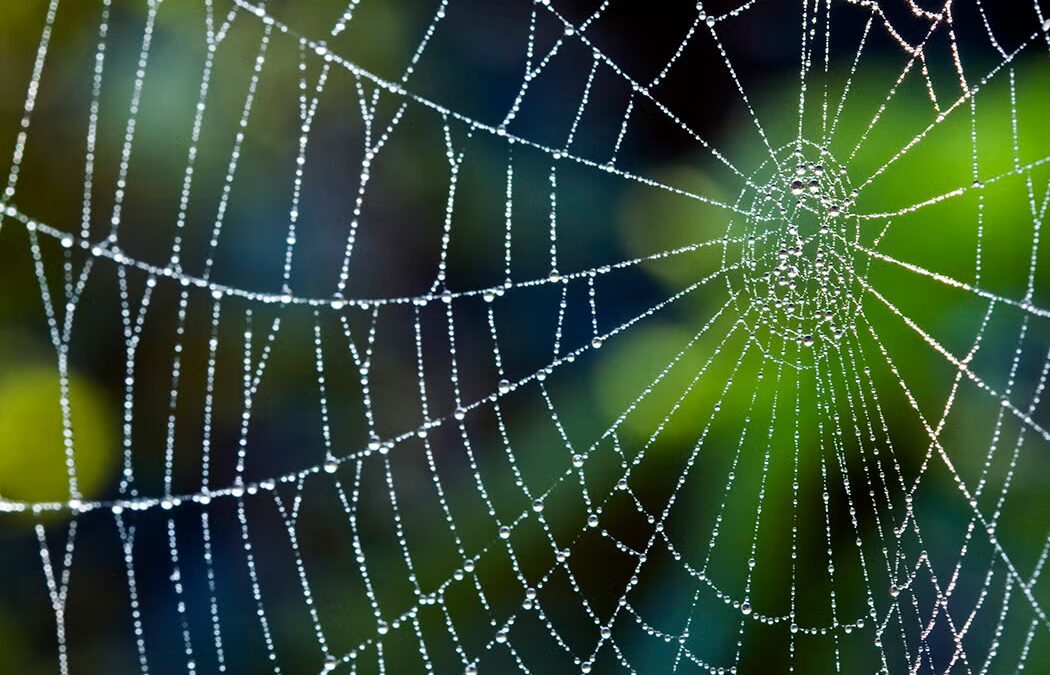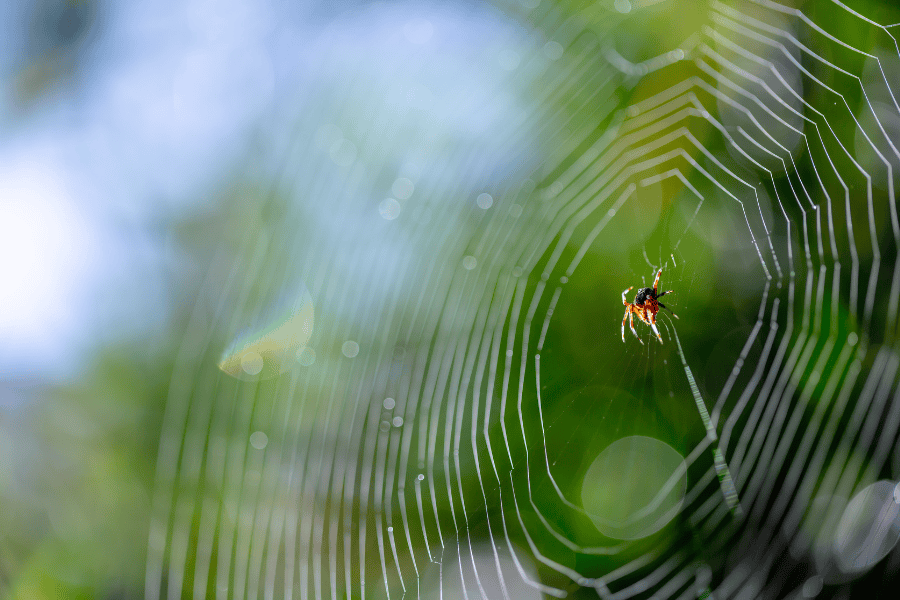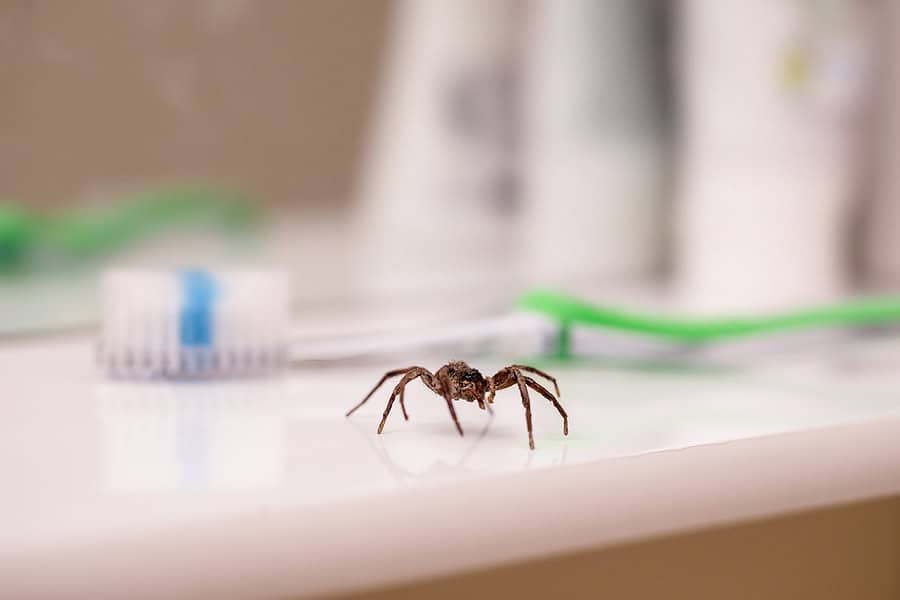
Feb 4, 2025 | Florida Pest Control
Living in Florida means enjoying the state’s lush ecosystems and warm climate—but it also means sharing your space with some unwelcome eight-legged visitors. While most spiders are harmless and even beneficial by controlling insect populations, others can pose serious risks if not properly identified and managed. If you’ve discovered a spider in your home or garden, this guide will help you recognize some of the most common spiders in Florida and give you the tools to handle them without causing any harm to you or them.
Common Spiders in Florida
Why Identifying Spiders in Your Home Matters
Spiders are nature’s pest controllers, reducing the need for chemical pesticides by preying on insects like flies and mosquitoes. However, not all spiders are friendly neighbors. Venomous species like the Brown Recluse and Black Widow can pose health risks to humans, which is why proper identification is essential. Knowing whether you can coexist or need professional help ensures that you take the right action.
For those focused on eco-friendly practices, understanding which spiders are harmless can allow you to protect beneficial species while maintaining a healthy environment around your home.
Florida’s Most Common Household Spiders
Black Widow
- Appearance: Shiny black body with a distinctive red hourglass marking on its underside.
- Size: Females are about 1.5 inches (with legs), while males are smaller.
- Habitat: Prefers sheltered spaces like woodpiles, garages, or under outdoor furniture.
- Risk Level: Black Widow venom is neurotoxic, causing muscle pain and cramps, and potentially serious health complications. Biting is usually a last resort, usually when they are inadvertently squeezed which can happen easily for example when someone is putting on outdoor shoes.
- How to Identify: Look for the unmistakable red hourglass on the abdomen and irregular, messy webs.
- What to Do: Call a professional for secure removal. Avoid handling them, as their bites can be dangerous.
Orb-Weaver Spider
- Appearance: Often tan or brightly colored with spiny or ornate patterns on the abdomen.
- Size: Up to over 3 inches.
- Habitat: Common in gardens, yards, and between trees, where they spin large, circular webs.
- Risk Level: Harmless to humans and beneficial for pest control.
- How to Identify: Their large, intricate webs are hard to miss in outdoor spaces.
- What to Do: Appreciate their role in pest control and allow them to thrive in your garden.
Jumping Spider
- Appearance: Compact, with either black or colorful bodies, large forward-facing eyes, and short legs.
- Size: Typically 1/4 to 1/2 inch.
- Habitat: Found indoors on walls, windowsills, or furniture, as well as outdoors.
- Risk Level: Non-venomous and shy, these spiders are harmless.
- How to Identify: These spiders leap rather than crawl and have large, prominent eyes.
- What to Do: They’re harmless, but if you prefer them outside, simply relocate them.
Wolf Spider
- Appearance: Brown, gray, or black with a robust, hairy body and distinct back markings.
- Size: 1/2 to 2 inches.
- Habitat: Often seen scurrying across floors in basements, garages, or on the ground outdoors.
- Risk Level: Though large, they are not dangerous.
- How to Identify: Wolf spiders don’t spin webs; they’re fast hunters that catch prey with their speed.
- What to Do: If you find one indoors, gently catch and release it outside.
Eco-Friendly Pest Control for Spiders
If you’re an environmentally conscious homeowner, there are several ways to manage spider populations while keeping your space pest free and sustainable:
Preventative Measures
- Declutter: Remove piles of leaves, wood, or debris near your home to eliminate spider hiding spots.
- Seal Entry Points: Inspect windows, doors, and any cracks or gaps to prevent spiders from entering.
- Reduce Outdoor Lighting: Use yellow or sodium vapor lights, which attract fewer insects and, in turn, fewer spiders.
Eco-Friendly Repellents
- Essential Oils: Spiders dislike peppermint, tea tree, and eucalyptus oils. Mix a few drops of water and spray in areas where spiders are active.
- Vinegar Solution: A simple mixture of equal parts vinegar and water can help deter spiders and clear away webs.
Why Spiders Matter in the Ecosystem
Before rushing to remove every spider, remember their ecological benefits:
- Natural Pest Control: Spiders help reduce the number of pests like mosquitoes and flies, which can be more bothersome than the spiders themselves.
- Part of the Food Chain: Spiders are prey for birds, reptiles, and other beneficial creatures.
By allowing harmless species to thrive in and around your home, you’re supporting a balanced ecosystem that benefits both your environment and your family.
Keep Your Home Spider-Free and Balanced
Living in Florida means sharing your space with spiders, but understanding which common spiders in Florida are beneficial and which are harmful will help you manage them responsibly. If you find yourself dealing with venomous spiders, don’t hesitate to contact a professional pest control service. Always prioritize eco-friendly methods for a pest-free home and a healthier local environment.

Jan 15, 2025 | Florida Green Pest Control
Fort Myers, Florida, offers beautiful surroundings, but its warm climate also attracts pests—spiders included. While most spiders are harmless, their presence can still be unsettling. For eco-conscious homeowners, green pest control offers a natural solution to manage spiders without resorting to harsh chemicals. Here we break down eco-friendly spider control, its benefits, and DIY prevention tips.
Eco-Friendly Spider Control For My Home
Why Choose Green Pest Control for Spiders?
Green pest control focuses on eco-friendly methods that effectively eliminate spiders while protecting the delicate Floridian ecosystem.
- Healthy for Family and Pets: Natural, non-toxic repellents and exclusion techniques ensure your family and pets are not in contact with harmful products.
- Eco-Friendly: Green methods protect beneficial species and minimize environmental impact.
- Long-Term Solutions: Green pest control addresses the root causes of spider problems, ensuring lasting results.
Common Spiders in Fort Myers
- Common House Spider: Harmless but unwelcome.
- Wolf Spider: Large but non-venomous.
- Black Widow: Venomous, requiring immediate attention.
- Brown Widows: Very venomous, causing serious bites.
Identifying the spider species helps determine the most effective green solutions.
Eco-Friendly Spider Control Methods
- Seal Entry Points: Seal cracks and gaps around windows, doors, and foundations to prevent spiders from entering.
- Use Natural Repellents: Essential oils like peppermint and eucalyptus are great natural deterrents. Spray diluted oil around windows and doorways.
- Maintain Cleanliness: Regular vacuuming and decluttering reduce hiding spots and webs.
- Exclusion Techniques: Install door sweeps and screen vents to block spider access.
- Humane Traps: Use non-toxic traps to catch and release spiders outside.
DIY Preventative Tips
- Reduce Clutter: Clear out basements and attics to eliminate hiding spots.
- Control Humidity: Use dehumidifiers to make your home less inviting to spiders.
- Limit Outdoor Lighting: Reduce lights that attract insects, which spiders feed on.
By opting for green pest control, you can enjoy a spider-free home in Fort Myers while protecting your health and the environment. Natural methods like sealing entry points, using repellents, and maintaining cleanliness offer long-term, eco-friendly spider control solutions for spider management. If you’re interested in green pest control for your property, call a local pest control company near you for a free estimate!

Dec 12, 2024 | Florida Pest Control
As the cooler weather settles in here in Pompano, homeowners may notice an increase in spider activity around their homes. While these eight-legged creatures can be unsettling, understanding their behavior and how to manage them can help keep your home comfortable and pest-free.
Understanding Spider Activity
Why Are Spiders Coming Indoors?
As temperatures drop, many insects become less active, which can lead spiders to seek shelter indoors where it’s warmer and food is more readily available. Spiders are natural predators, and they often move inside to find their next meal, which may include other pests hiding in your home.
Common Areas for Spider Activity
Spiders are excellent at finding cozy spots to spin their webs. Here are some common areas you should check around your home:
- Corners: Spiders love to create webs in undisturbed corners of rooms. Regularly dusting these areas can help keep webs at bay.
- Basements: These darker, cooler spaces are ideal for spiders looking for refuge. Keep your basement tidy and decluttered to reduce hiding spots.
- Attics: Another popular spot for spiders, attics can accumulate dust and debris, making them inviting for these critters. Inspect your attic regularly to ensure it’s well-maintained.
Tips for Managing Spider Activity
- Regular Cleaning: Dust and vacuum your home regularly to remove spider webs and any potential food sources for spiders, such as other insects.
- Seal Entry Points: Check for cracks and gaps around windows, doors, and the foundation of your home. Sealing these entry points can help prevent spiders from making their way inside.
- Reduce Clutter: Keeping your home organized and free from clutter makes it less inviting for spiders. Pay special attention to storage areas like basements and attics.
- Natural Deterrents: Consider using natural repellents, such as essential oils like peppermint or tea tree oil, which are known to deter spiders. Mix a few drops of water in a spray bottle and apply it to areas where you’ve seen spider activity.
- Consult a Professional: If you’re facing a significant spider problem or are unsure how to handle it, don’t hesitate to contact a pest control professional. They can provide tailored solutions to keep your home spider-free.
While spiders play a beneficial role in controlling insect populations, their presence in your home may not always be welcome. By staying proactive and keeping an eye out for spider activity, you can maintain a comfortable living space in Pompano. Embrace the cooler weather and take these steps to ensure your home remains a cozy refuge—without any unexpected visitors!

Oct 15, 2024 | Florida Pest Control
If there’s one thing most of us can agree on, it’s that spiders belong outside, not taking over our Naples homes! While these eight-legged visitors may be great for controlling other pests, no one wants to find them lurking in every corner of our home and property. If you’re tired of spotting webs and want to keep spiders out of your home, here’s how you can send them packing!
Easy DIY Steps to Keep Spiders Out
Naples offers a warm, humid climate that spiders thrive in! These pests are attracted to dark, undisturbed places like attics and even your closets. Plus, if you’ve got other pests hanging around, spiders will happily stick around for an easy meal. Check out our do-it-yourself tips to deter spiders from your home and property:
- Seal Up Entry Points: Spiders are sneaky and can slip through tiny cracks in doors, windows, and walls. Make sure to check for gaps or holes around your home and seal them with caulk or other sealants, depending on the size of the opening. Pay extra attention to places like vents, pipes, and electrical outlets.
- Declutter Your Spaces: Spiders love clutter! Piles of clothes, old boxes, and unused furniture give them the perfect hiding spots. Keep things tidy, especially in storage areas like the garage, attic, or basement, where spiders often make themselves at home.
- Turn Off Outdoor Lights at Night: Outdoor lighting can attract household pests, which in turn attract spiders. Turning off unnecessary lights in the evening can help reduce the spider activity around your home.
- Keep Your Home Clean: Spiders love places that are dusty and undisturbed. Regularly vacuuming, dusting, and wiping down surfaces can help make your home less inviting to them. Don’t forget to sweep away those webs too!
- Control Other Insects: Spiders go where their food is – so if you’ve got a pest problem, you’re likely to see spiders, too. Consider scheduling regular pest control treatments to help keep household pests in check.
- Consider Natural Repellents: Certain essential oils, like peppermint and tea tree oil, are known to repel spiders. You can mix a few drops of water and spray it around windowsills, doorways, and other spider-prone areas for a natural deterrent.
If you’ve tried everything and still find spiders creeping around, it might be time to call a local pest control company near you. These professionals can treat both the inside and outside of your home, ensuring that you can keep spiders out of your home.

Jul 10, 2024 | DIY Pest Control, Florida Pest Control
Spiders are typically harmless and even deemed beneficial by controlling other pests, but having them in your home can be alarming! We breakdown some easy do-it-yourself spider prevention tips that you can use around your Lauderhill home.
DIY Spider Prevention Tips
Keep you Home Clean & Clutter-Free
Spiders love to hide in cluttered spaces, so keeping your home clean and tidy can significantly reduce the chances of them making themselves at home. Always vacuum regularly, paying extra attention to corners, underneath furniture, and hard-to-reach areas. Look at dust surfaces and if you spot a spider web with no spider, carefully remove the web. It’s also crucial to declutter storage spaces, basements, attics, and garages. Organize items in sealed plastic containers instead of cardboard boxes, which spiders will infest.
Seal Entry Points
Spiders will enter homes through the tiniest cracks and gaps. Sealing these openings will help keep them from entering. Inspect your home and check for cracks in the walls, windows, and doors. Seal any you may find as soon as possible with sealant or caulk. Ensure that your windows and vents have tight-fitting screens, replacing any damaged screens to prevent entry.
Reduce Outside Lighting
Spiders are attracted to insects, which are drawn to lights at night. Look to reduce outdoor lighting to minimize spider activity. Replace white bulbs with yellow bulbs, as insects are less attracted to it. Additionally, consider utilizing timed outdoor lights to avoid them staying on overnight and attracting insects.
Maintain Your Yard
Your yard is the first line of defense to discourage spiders from entering your property, so it’s important to keep it well-maintained. Keep shrubs, trees, and other plants trimmed and pointing away from your home. Clear out leaves, unused woodpiles, and debris that spiders can hide in. If you use mulch, avoid placing it near your foundation so it doesn’t provide a habitat for spiders and other pests.
Regularly Inspect for Spiders
Keeping an eye out for early signs of spider activity will help you address the issue before it becomes a full-blown infestation. Make sure to regularly inspect areas like closets, basements, and garages for webs and spiders.
If you notice a significant spider problem, it’s always best to call a pest control company near you to help. These professionals will provide you with a comprehensive inspection and the best pest control plan for your situation.




